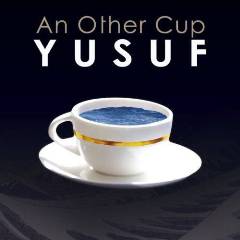Cat Stevens (Yusuf Islam) - An Other Cup Of Yusuf (2006)
Cat Stevens (Yusuf Islam) - An Other Cup Of Yusuf (2006)

1 Midday (Avoid City After Dark) 4:25 2 Heaven / Where True Love Goes 4:50 3 Maybe There's A World 3:07 4 One Day At A Time 4:54 5 When Butterflies Leave 0:41 6 In The End 4:02 7 Don't Let Me Be Misunderstood 3:23 8 I Think I See The Light 5:34 9 Whispers From A Spiritual Garden 2:05 10 The Beloved 4:52 11 Greenfields, Golden Sands 3:26 12 There Is Peace 3:03 Yusuf - vocals, guitar, keyboards Alun Davies – guitar Jean Russel – Keyboards Lu Edmonds - ouz, dabruka, saz Danny Thompson – bass Luis Jardim – percussion Youssou N'Dour – vocals
Yusuf Islam's last recording as Cat Stevens, released in 1978, was Back to Earth, a record full of lost and disillusioned emotions and the desire to be whole and to find something more. Now 28 years later, Yusuf gives listeners An Other Cup, a recording that reveals the benefits and the gifts that his conversion to the religion of Islam gave him. With co-producer Rick Nowels, old mates like guitarist Alun Davies, Jean Roussel, and bassist Danny Thompson, and new ones like Youssou N'Dour, Islam returns to the folk-pop idiom of Catch Bull at Four, the aforementioned album, and moments of Foreigner. While the production on this record is full, it feels more stripped down than most of his work. And what's so interesting is that while he may have left behind the minutely detailed searching scenarios his songs related for more spiritual and general sense impressions, it's about the only thing that's changed. His voice is warm, rich, and inviting, his melodies are as irresistible as ever, and his way of relating his experience is direct. It's true there are a lot more holistic themes on this set, deeply spiritual tomes that offer advice, but they also enthusiastically relate the benefits of what he's found. Is it preachy? Yep, a bit, but so was Bob Dylan's Slow Train Coming. That's not to equate this record in terms of its profundity, but more to say that anyone who appreciates what Stevens did in a previous life can rejoice in the subjective truths related here. Songs like "Maybe There's a World," "In the End," the horn-drenched opener "Midday (Avoid the City After Dark)," and "Greenfields, Golden Sands" are memorable and delightful for their simplicity and directness. There is also a curious cover on this set: a string-drenched arrangement of "Don't Let Me Be Misunderstood" that's about as far from the Animals' version as one can get. It's a bit over the top, and it's more in your face than anything else here and therefore doesn't work. It's downright sappy. Otherwise, this record is a minor but pleasantly unexpected surprise. It also lends a more human face to the man's often distorted life as a devout pilgrim on his way to seeking God. Doing that in a pop setting is a tightrope walk, but Islam obviously doesn't really care, and he keeps his record free from the trappings of trying too hard. If you missed Cat Stevens, meet Yusuf Islam. On An Other Cup, he delivers what you've been waiting for. ---Thom Jurek, Rovi
Powrót Yusufa Islama vel Cata Stevensa po prawie trzydziestu latach przerwy na scenę muzyczną był wydarzeniem naprawdę dużego kalibru. Szczególnie, że był to powrót w naprawdę wielkim stylu. Całe lata 70-te, Stevens uznawany był za jednego z najciekawszych i najlepszych brytyjskich wykonawców, a w pierwszej połowie tamtej dekady nagrał kilka znakomitych płyt, które na stałe weszły do kanonu muzyki rozrywkowej. Powszechnie traktowany jest jako balladzista, ale nie jest ot typowy bard z gitarą . Oczywiście ballad zawsze było dużo i głownie z ich powodu zdobył sobie popularność. Ale te wszystkie płyty były bardzo urozmaicone muzycznie, nie trudno było tam znaleźć elementy folkloru z Bałkanów, co jest jakby naturalne, ale też na przykład elementy muzyki afrykańskiej(“Longer Boats”). Oprócz ballad było też zawsze sporo utworów znacznie żywszych , na przykład “Peace Train”, “Can’t Keep It in” albo “Tuesday’s Dead” wykonywane w charakterystyczny dla Stevensa, niepodrabialny sposób, ze specyficznie połamanymi rytmami, często z fortepianem wspomagającym sekcję rytmiczną “rąbanymi” akordami. Potrafił się porwać również i na duże formy, i to z powodzeniem – vide suita “Foreigner” z 1973 roku. Prawdopodobnie to jego największe dzieło.
Powrót Cata Stevensa vel Yusufa Islama z “wewnętrznej emigracji” nie miał takiej oprawy na jaka zasługiwał, wracała bądź co bądź jedna z największych gwiazd muzyki rozrywkowej lat siedemdziesiątych. Było to chyba spowodowane nieco dwuznaczną aurą wokół artysty. Ta konwersja na islam, to nieszczęsne poparcie wyroku śmierci na Rushdiego, a i ten zupełnie nie sprzyjający islamowi w ostatnich kilku latach klimat (prawdę mówiąc sami wyznawcy bardzo się o to postarali). Jednak nie przeszkodziło to płycie w odniesieniu sporego sukcesu – w Wielkiej Brytanii “An Othe Cup” weszło do pierwszej dwudziestki sprzedając się od razu w pierwszym tygodniu w 90 tysiącach egzemplarzy, a za oceanem było niewiele gorzej – pierwsza pięćdziesiątka. Jak na sześćdziesięciolatka “podejrzanej konduity” po trzydziestoletniej przerwie w działalności - chyba bardzo dobrze. ---Wojciech Kapała, artrock.pl
download (mp3 @224 kbs):
yandex 4shared mega mediafire zalivalka cloudmailru oboom uplea








